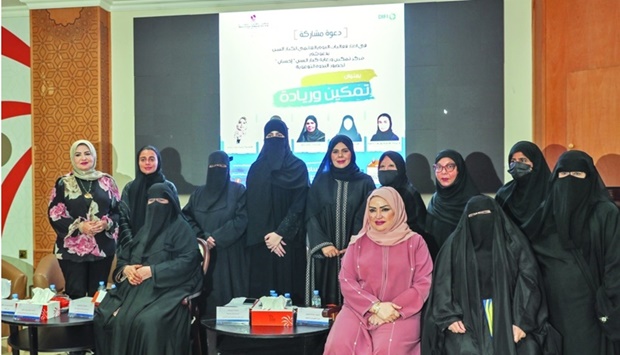The Centre for Empowerment and Care of the Elderly (Ehsan) organised an awareness seminar entitled, 'Empowerment and Entrepreneurship', on the occasion of the International Day of Older Persons, with the participation of national stakeholders.
Ehsan Centre discussed the importance of empowering older women, and the opportunities available to them to continue their participation and contributions in various fields.
It also highlighted their contribution to the daycare programmes offered by Ehsan Centre, and presented real experiences of their contributions in various fields.
The event included working papers presented by female specialists, researchers and experts in empowering elderly women in Qatar.
The first paper dealt with the importance of empowering older women, and was presented by Fatima Yousef al-Mutawa, a research and grants specialist at Doha International Family Institute, in which she spoke about the increasing number of elderly people in the world, and that they represent a large and growing segment of the population, as the number of elderly has exceeded 700mn in 2020. For the first time in human history, the number of elderly people is expected to exceed the number of children in 2050. Therefore, al-Mutawa stressed the importance of involving the elderly in all political, economic and social fields.
She pointed out that the number of elderly people in Qatar increased about five times from 1986 to 2019, and that the increase is expected to reach about 30% of the total population during 2050.
For her part, Manar al-Dosari, researcher in studies of the elderly and people with disabilities at the Ministry of Social Development and the Family, discussed the ministry's role in empowering elderly women, and indicated that the number of productive families in the elderly group reached 135.
Al-Dosari drew attention to the recommendations of the Ministry of Social Development and the Family, which stipulated empowering older women in all fields, supporting and assisting them in participating, communicating and integrating into society through social activities, taking into account all social, economic, humanitarian and health measures, preparing educational courses and workshops, and encouraging them to do volunteer work. In addition, it was stressed to hold forums to present and benefit from the experiences of elderly people.
The awareness seminar concluded with a realistic experience presented by Aisha al-Tamimi, a culinary and etiquette expert, who spoke about her extensive experience in this field. (QNA)
Ehsan Centre discussed the importance of empowering older women, and the opportunities available to them to continue their participation and contributions in various fields.
It also highlighted their contribution to the daycare programmes offered by Ehsan Centre, and presented real experiences of their contributions in various fields.
The event included working papers presented by female specialists, researchers and experts in empowering elderly women in Qatar.
The first paper dealt with the importance of empowering older women, and was presented by Fatima Yousef al-Mutawa, a research and grants specialist at Doha International Family Institute, in which she spoke about the increasing number of elderly people in the world, and that they represent a large and growing segment of the population, as the number of elderly has exceeded 700mn in 2020. For the first time in human history, the number of elderly people is expected to exceed the number of children in 2050. Therefore, al-Mutawa stressed the importance of involving the elderly in all political, economic and social fields.
She pointed out that the number of elderly people in Qatar increased about five times from 1986 to 2019, and that the increase is expected to reach about 30% of the total population during 2050.
For her part, Manar al-Dosari, researcher in studies of the elderly and people with disabilities at the Ministry of Social Development and the Family, discussed the ministry's role in empowering elderly women, and indicated that the number of productive families in the elderly group reached 135.
Al-Dosari drew attention to the recommendations of the Ministry of Social Development and the Family, which stipulated empowering older women in all fields, supporting and assisting them in participating, communicating and integrating into society through social activities, taking into account all social, economic, humanitarian and health measures, preparing educational courses and workshops, and encouraging them to do volunteer work. In addition, it was stressed to hold forums to present and benefit from the experiences of elderly people.
The awareness seminar concluded with a realistic experience presented by Aisha al-Tamimi, a culinary and etiquette expert, who spoke about her extensive experience in this field. (QNA)

